Mountain West Cancer Control Contingent Meets with Congressional Delegation
03 March, 2025
Last Thursday, March 27, a contingent of cancer control professionals working in states across the Mountain West traveled together to Washington D.C. to share local insights with congressional representatives. The group represented Nevada, Idaho, Utah, Wyoming, and Montana and was organized by a team from Huntsman Cancer Institute, a National Cancer Institute cancer center that serves communities in all five states.
As advocates for better health outcomes, NCC and other partners from the five-state region work across state lines to address these challenges and ensure that no one is left behind. That includes meeting with senators and representatives to share how the states are working together to reduce the burden of cancer.
The team met with Republican and Democratic officials including Montana Sens. Sheehy and Daines; Wyoming Sens. Lummis and Barrasso; Nevada Sens. Cortez Masto and Rosen; Idaho Sens. Crapo and Risch; Utah Sens. Lee and Curtis; and Utah Rep. Kennedy. NCC’s Executive Director Cari Herington met with both Nevada senators, and also went to meetings with the Utah, Montana, and Idaho officials to show how the states are working together on cancer control.
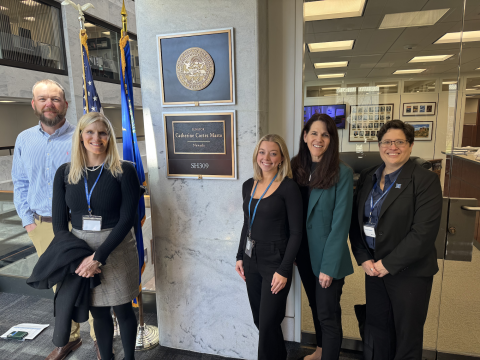
Among the key messages delivered by the Mountain West contingency was that potential changes and disruptions to critical health programs and funding for cancer research will harm the residents of our states. Continued support from the Centers for Disease Control and Prevention (CDC) is essential for cancer prevention, screening, and control efforts at local, state, and regional levels. Additionally, ongoing investment in Medicaid, telehealth services, and improved connectivity is vital to ensuring equitable access to care for all.
Herington and others educated officials on the unique barriers people who are living in rural communities often face when it comes to healthcare. Rural cancer patients are 10% more likely to die from their disease compared to those living near major medical centers. This statistic underscores the urgency of our work, and the important contribution the federal government makes to support programs and services that improve access to healthcare for those people.
The visits also provided Herington an opportunity to acknowledge and thank Nevada’s senators for their efforts on key initiatives to reduce healthcare provider shortages and improve access to healthcare.
The conversations with elected officials and staffers in the congressional offices also revealed several important insights.
Members of Congress often learn about policy shifts at the same time as the public. They emphasized the importance of keeping them informed about developments in the states so they can better advocate for those communities.
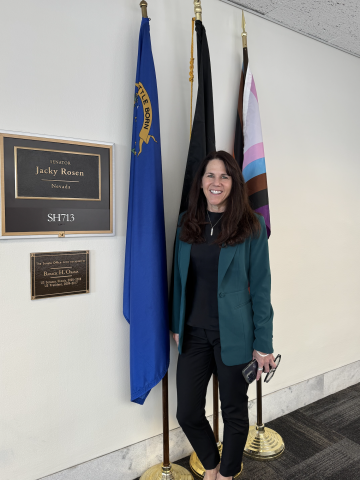
Advocacy also makes a difference. While their offices are inundated with emails and phone calls from constituents, they assured the team that every message is reviewed and flagged as necessary. They also encouraged continued outreach—whether it’s about grant delays or broader funding concerns, like the loss of federal funding through DOGE cuts.
Advocacy efforts should target all members of Congress—regardless of party affiliation—to ensure widespread support for critical health initiatives.
The fight against cancer requires sustained advocacy and collaboration at every level—local, state, regional, and national. Policymakers need to hear from us about the real-world impacts of funding cuts and program changes on our communities. Whether it’s securing CDC funding for cancer prevention or expanding telehealth services, our voices can drive meaningful change.
We urge everyone—patients, providers, advocates—to keep raising these issues with their representatives. Together, we can build a future where every patient has access to life-saving care, no matter where they live.
You May Also Like
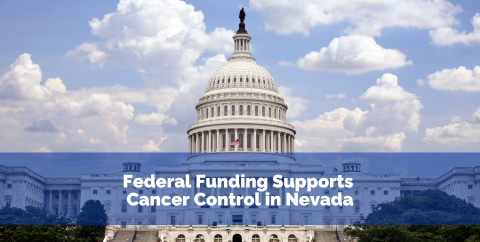
Federal Funding Supports Cancer Control in Nevada
02.04.2025
The change of presidential administrations in January 2025 brought with it increased scrutiny of federal program funding.
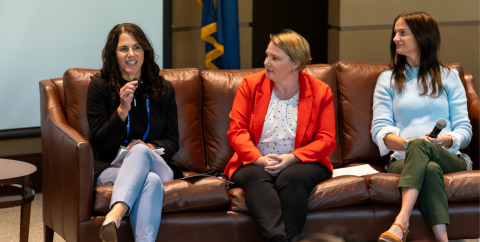
Reflections on the Cancer Center Community Impact Forum
11.22.2024
This year, NCC’s Executive Director Cari Herington was tapped to participate in a panel discussion during the Cancer Center Community Impact Forum
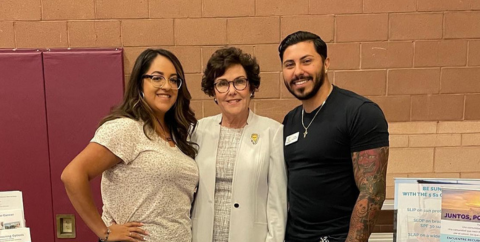
Senator Rosen Pushes for More Residency Slots
11.15.2024
As we continue work on the 2026-2030 Nevada Cancer Plan, it has been made clear that we must focus on expanding our healthcare workforce and incre